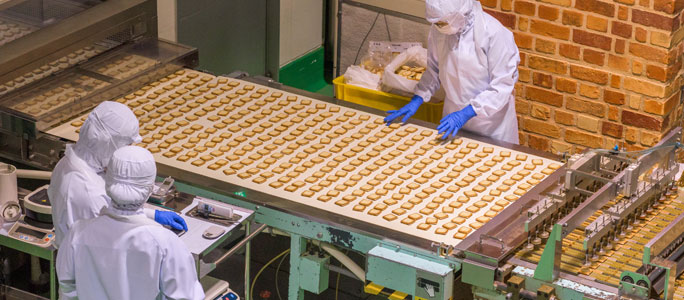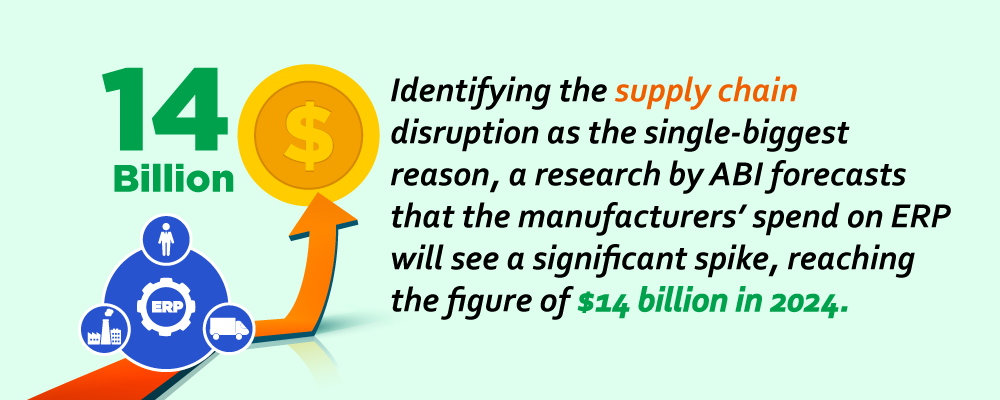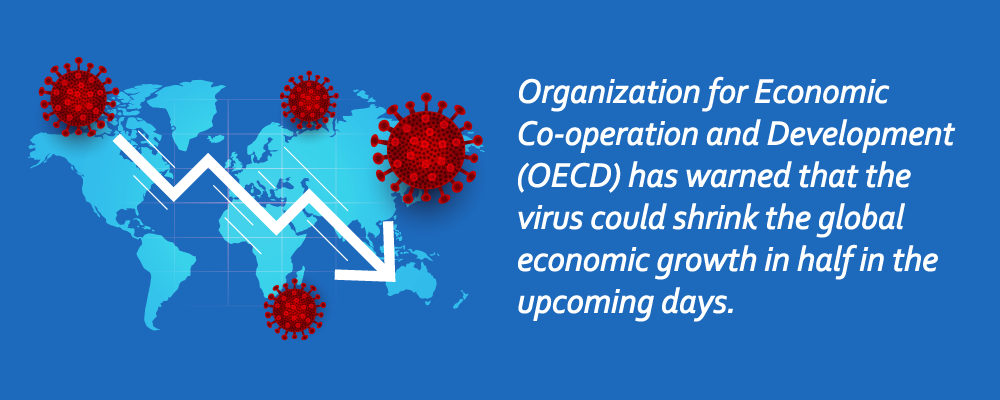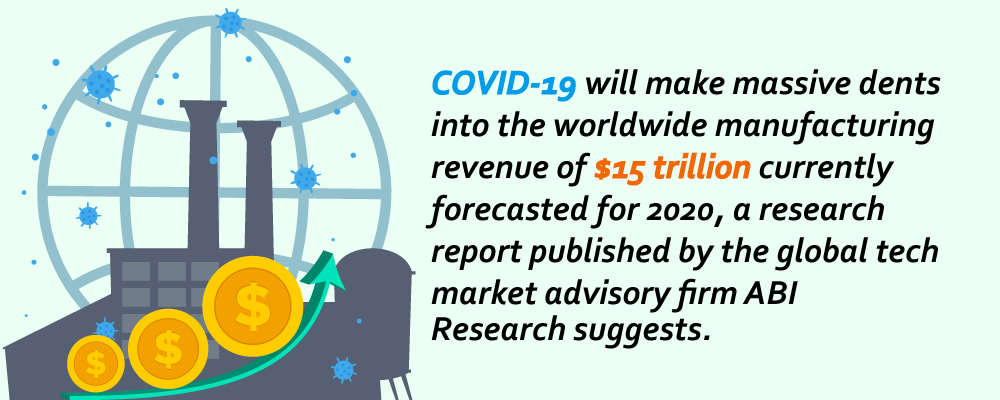
COVID-19 has engulfed the entire world, disrupting millions of lives and livelihoods in the process. And while most people believe its threat will subside only when the vaccine comes out, many others believe even the vaccine won’t change things much, with the Coronavirus likely to stay with us for a long time to come.
The impact of Coronavirus has been both global and unpredictable, and just like others, the businesses too have taken a beating at the pandemic’s hands, so much so that

For the past six months or so, the story of the manufacturing sector has been all about the industrial manufacturers being impacted by COVID-19, and how they are striving to keep their businesses afloat amid the global pandemic.
Food manufacturers too are the victims
In fact, among the many different sectors of manufacturing that have witnessed a downward spiral, the food & beverage industry seems to have taken the worst hit.
And from the looks of it, there won’t be any respite in near future, as the

At present, the food & beverage manufacturing companies are facing significantly reduced consumption as well as supply chain issues.
The supply of raw materials and ingredients to the manufacturing sites has been affected big time, which has hampered production.
Also, manpower availability in the time of social distancing has been another major headache.
Long story short, the manufacturers are under tremendous pressure to do more with less or minimal resources on the plant floor to minimize possible exposure to the virus.
Besides, they are in need of a better way to maintain visibility into the process.
And, they have looked clueless so far
With the Coronavirus threat still looming over, the food manufacturers will need to prepare themselves for its short-term as well as long-term impact.
They will have to work out a strategy for immediate sustenance, as well as revival in the post-COVID world.
At the moment, most of them look clueless, and rightly so, for no business has had to deal with so much uncertainty at one time.
Their response to the pandemic has been varied so far. While some have decreased production and furloughed workers, others have increased, shifted, or relocated production to meet demand.
Quite a few have innovated to manufacture new products.
But, on the whole, the food & beverage manufacturers have largely looked helpless, and in dire need of a tool, technology, or approach that can prove to be the game-changer amid such times.
All of this points to the potential of implementing a tool that can automate processes, and facilitate doing more with less for the food manufacturers.
The technology of the future
As mentioned above in brief, the virus will have both short- and long-term ramifications for manufacturers.
While the immediate focus will be on securing supplies, in the longer term, manufacturers will need to assess and understand their risk exposure, including the operations of their supplier’s suppliers.
There will be new regulatory guidelines in place, and with consumers increasingly becoming conscious about the safety and quality of food products they consume in the existing and post-COVID world, the food manufacturers will need to ensure they have quality control (QC), traceability, inventory management, and compliance tools in place.
There’s also going to be a need for introducing new digital technologies as well as approaches to support the needs of remote and on-site workers, increase manufacturing and product flexibility, apart from meeting the supply chain challenges, and analyzing risks.
ERP- the gamechanger
To deal with the enormous impacts of the Coronavirus on different aspects of their business, the most logical tool the food manufacturers are going to turn to is the enterprise resource planning (ERP) software.

To get a better perspective on how a food ERP software can help food manufacturing businesses deal with the challenges created by COVID-19, in a post-COVID world, let’s take a look at the points mentioned below:
Supply chain:
COVID-19, the subsequent panic buying, and the supply chain delays quickly exhausted the food supply chain, exposing a major vulnerability in manufacturing operations of food manufacturers across the globe.
This created a need for the food manufacturers to have multiple sources of procurement, and make their supply chain more flexible, agile, and importantly, resilient.
An ERP software can help with it, by synchronizing the supply chain with the manufacturing, distribution, and procurement processes.
By giving a basis for more intuitive communications, better lead times, prior warnings for quantity adjustments, and more reliable predictive modeling, it helps create a resilient, responsive, and flexible supply chain, so as to avert any future supply chain crisis.
Inventory:
Given the limited shelf life of food products, inventory management is a crucial business area for food manufacturers.
The perishable factor means that the F&B inventory, if not stored hygienically, is highly susceptible to foodborne pathogens and more.
And these food borne bacteria can have a disastrous impact on the company’s reputation. The food manufacturers thus need a food manufacturing software with enhanced inventory management functionality, which allows shelf-life determination and expiration management, moving forward.
Quality control:
COVID-19 has put greater emphasis on the need to maintain quality, safety, and hygiene of food products, on the manufacturer’s part.
The QC module of a food ERP solution ensures putting in place best practices for maintaining the quality of any material that comes in, and the product that leaves the four walls of the manufacturing unit, through quality checks at all stages.
Traceability:
In the post-COVID world, more and more consumers would want to know every minute detail about the journey of the product they consume from farm to fork- i.e.
How it was processed, where it came from, how it was grown, what nutritional value does it hold, and in what proportions, etc., allowing ‘ingredient labeling’ to form a major part of the packaging process.
Only a food manufacturing software with traceability functionality can help manufacturers accurately trace the data throughout the entire flow of production, drill down into records and batch sequences for auditing and transaction history, and make timely recalls, thus earning them greater trust and confidence from the stakeholders like the retailers, consumers, auditors, regulators, and inspectors.
Regulatory compliance:
COVID-19 has prompted organizations such as the FDA, EPA, OSHA, FTC, and other government bodies, to further tighten norms pertaining to the launch of healthy products, regulating food labels, maintaining a clean, hygienic environment, etc.
Measures have been taken worldwide to deny entry of unsafe products, as well as to review firms’ previous compliance history.
In such a scenario, investing in a food manufacturing software with regulatory compliance module is food manufacturers’ best bet, so as to meet all the stringent local, national, and global regulatory compliance requirements.
Digital transformation initiatives:
The pandemic has given birth to the need to keep the business running remotely, or with a limited workforce.
In such times, the value of investing in digital transformation initiatives has been strongly felt.
Investing in technologies like Artificial Intelligence (AI), and the Internet of Things (IoT), and their integration with food ERP system, offers manufacturers a controlled way to uphold operational efficiency.
These technologies can not only monitor equipment and manufacturing parameters, but also provide a solid foundation for improved predictive maintenance.
They can manage the larger data sets that can assist in forecasting inventory needs, refining business processes, and managing “unpredictable” anomalies like COVID-19.
Predictive analytics can also help food manufacturers with the insight needed to keep them agile, and help manage risks better. Besides, these technologies also facilitate effective handling of cash flow, which, during a crisis, is very important.
Other benefits include reduced unplanned downtime, capital expenditure, and asset maintenance costs, besides improved safety and workforce effectiveness.
Conclusion
Points mentioned above make it amply clear that a good food ERP software is the most effective tool that can help food manufacturers deal with the challenges posed by COVID-19; today, and in the post-COVID era. BatchMaster ERP for Food is one such ERP.
To know more about how it can help you relieve, revive, and rebuild your food manufacturing business for the future, get in touch to arrange a free demo.



















